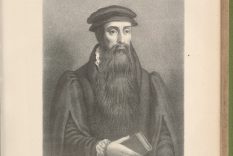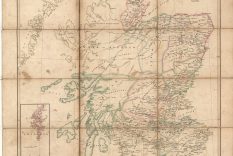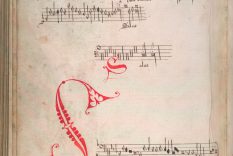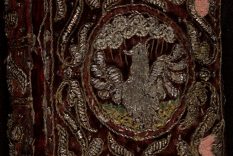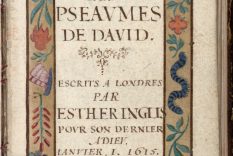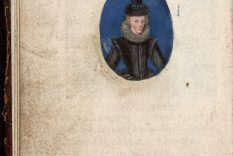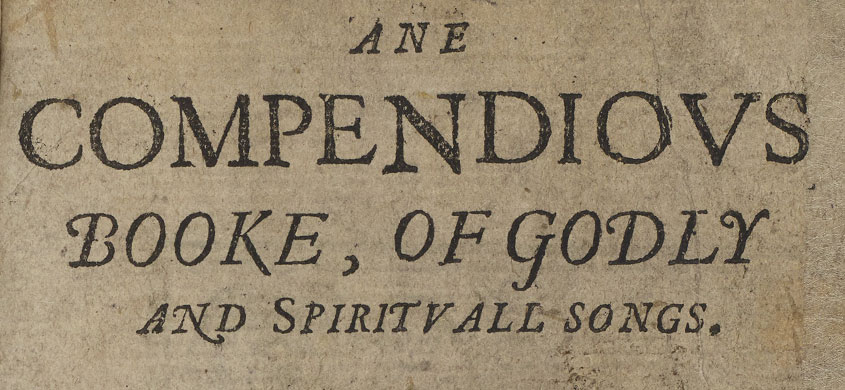
First imprentit in 1567 an kent as ‘The Dundee Psalms’, ‘The Gude and Godly Ballatis’, wir eventually collectit intae ‘Ane Compendious Book of Godlie and Spirtualle Sangs.’
The Dundee Psalms wir maistly attributit tae brithers John, James an Robert Wedderburn. The latter is thocht tae hae been a main contributor tae the 1549 political tract ‘The Complaynt of Scotland’. The Reformation movement, in luikin tae mak scripture braidly available tae the masses, adaptit melodies frae popular ballads – ettlin tae hae them ‘changed out of prophaine songs’ by remuivin the original wirds an replacing these wi scriptural verses in the ‘vulgar tongue’. The Reformers thocht that bi learin religion throu a kenspeckle tung – raither than in the Latin mass o the auld faith – congregations micht be brocht closer tae the fauld o kirk an God.
The original text o ‘The Gude and Godly Ballatis’ wis reprentit bi the Scottish Texts Society in 1897. Baith a digitised an original copy o this are held at the Naitional Leebrar o Scotland, as weel as a 1621 copy o ‘Ane Compendious Book of Godlie and Spiritualle Sangs.’
Lear mair aboot Ane Compendious Booke
‘Ane compendious book of godlie and spiritualle sangs… collectit out of sundrie parts of scripture, with sundrie other ballates, changed out of prophaine songs, fir avoiding of sin and harlotrie, with augmentation of Sundrie gude and godly Ballates.’
‘We have here a plain text, that the Word of God increases plenteously in us, by singing Psalms and spirituall sangs, and that specially amang yong persons, and sik as are not exercised in the scriptures. Fir they will sooner conceive true word, not quhen they hear it sung in Latine, the quhilk they wot noght what it is. But when they hear it sung, or sing it to themselves in their vulgar tongue with sweet melody; then sall they love ther God, with hart & minde; and cause them till put away bawdrie and unclean sangs – Praise to God Amen.’
In ‘Popular rhymes of Scotland’ (1828-1870), Robert Chambers identifies the then popular Scottish lullaby ‘Baw Lula Law’ as haein a version in ‘Ane Compendious book of godlie and spiritualle sangs.’ In Walter Scott’s Waverley novel ‘The abbot’, Scott tells hou the ramstageous Reform mob, intent on the wreckin o the Kirk of Kennaquhair, as they gang on aboot thair business strike up a ballad cawed ‘Trim-go-trix’. Scott’s narrative goes:
‘Thundering out the chorus of a noble hunting song, which had been pressed into the service of some polemical poet, the followers of the Abbot of Unreason were turning every moment more tumultuous.’
Scott then provides a fitnote:
‘These rude rhymes are taken, with trifling alterations, from a ballad called Trim-go-trix. It occurs in a singular collection called ‘Ane compendious book of godlie and spiritualle sangs…this curious collection has been re-printed in Mr John Grahame Dalyell’s Scottish Poems of the 16th century.’
‘Ane Compendious Book’ appears tae question the notion that the Scots leid wis effectively displaced bi the introduction o the Inglish Geneva Bible in 1560 an bi the braider Inglish language influences o the Reformation. Conversely, it appears tae be mair the case that Scots as the common leid or ‘vulgar tongue’ cuid be yaised tae guid effect in spreidin the message o the kirk.
Takkin up this pynt in Maureen M Meikle’s ‘The Scottish people 1490-1625’ (imprentit 2014) the author scrieves:
‘Many of these spiritual pieces were translated or adapted from French, German and Scandinavian originals, with more than a hint of Lutheranism and Calvinism in them.’
‘The early reformers were using them in their services during the late 1550s, but they really took off in the 1560s when they became parodies of older secular songs.’
‘As they were designed to be sung to well-known secular tunes, The Gude and Godly Ballatis are credited with impressing the Reformation on the hearts and minds of Scots in a way that no amount of preaching could have done.’
First published in 1567 and known as ‘The Dundee psalms’, ‘The gude and godly ballatis’, were eventually collected into ‘Ane compendious book of godlie and spirtualle sangs.’
The Dundee psalms were mainly attributed to John, James and Robert Wedderburn. The latter is believed to have been a main contributor to the 1549 political tract ‘The Complaynt of Scotland’. The Reformation movement, in looking to make scripture widely available to the masses, adapted melodies from popular ballads – resolving to have them ‘changed out of prophaine songs’ by removing the original words and replacing these with scriptural verses in the ‘vulgar tongue’. The Reformers believed that by learning religion through a recognisable tongue – rather than in the Latin mass of the unreformed faith – congregations might be brought closer to the fold of church and God.
The original text of ‘The gude and godly ballatis’ was reprinted by the Scottish Texts Society in 1897. Both a digitised and original copy for this are held at the National Library of Scotland, as well as a 1621 copy of ‘Ane compendious book of godlie and spiritualle sangs.’
Learn more about Ane Compendious Booke
‘Ane compendious book of godlie and spiritualle sangs … collectit out of sundrie parts of scripture, with sundrie other ballates, changed out of prophaine songs, fir avoiding of sin and harlotrie, with augmentation of sundrie gude and godly ballates.’
‘We have here a plain text, that the Word of God increases plenteously in us, by singing Psalms and spirituall sangs, and that specially amang yong persons, and sik as are not exercised in the scriptures. Fir they will sooner conceive true word, not quhen they hear it sung in Latine, the quhilk they wot noght what it is. But when they hear it sung, or sing it to themselves in their vulgar tongue with sweet melody; then sall they love ther God, with hart & minde; and cause them till put away bawdrie and unclean sangs – Praise to God Amen.’
In ‘Popular rhymes of Scotland’ (1828-1870), Robert Chambers identifies the then popular Scottish lullaby ‘Baw Lula Law’ as having a version in ‘Ane compendious book of godlie and spiritualle sangs.’ In Walter Scott’s Waverley novel ‘The abbot’, Scott tells how the riotous Reform mob, intent on the wrecking of the Kirk of Kennaquhair, as they go about their business strike up a ballad called ‘Trim-go-trix’. Scott’s narrative goes:
‘Thundering out the chorus of a noble hunting song, which had been pressed into the service of some polemical poet, the followers of the Abbot of Unreason were turning every moment more tumultuous.’
Scott then provides a footnote:
‘These rude rhymes are taken, with trifling alterations, from a ballad called Trim-go-trix. It occurs in a singular collection called ‘Ane compendious book of godlie and spiritualle Sangs’…this curious collection has been re-printed in Mr John Grahame Dalyell’s Scottish Poems of the 16th century.’
‘Ane compendious book’ appears to question the notion that the Scots language was effectively displaced by the introduction of the English Geneva Bible in 1560 and by the wider English language influences of the Reformation. Conversely, it appears to be more the case that Scots as the common language or ‘vulgar tongue’ could be used to telling effect in spreading the message of the church.
Taking up this point in Maureen M Meikle’s ‘The Scottish people 1490-1625’ (published 2014) the author writes:
‘Many of these spiritual pieces were translated or adapted from French, German and Scandinavian originals, with more than a hint of Lutheranism and Calvinism in them.’
‘The early reformers were using them in their services during the late 1550s, but they really took off in the 1560s when they became parodies of older secular songs.’
‘As they were designed to be sung to well-known secular tunes, ‘The Gude and Godly Ballatis are credited with impressing the Reformation on the hearts and minds of Scots in a way that no amount of preaching could have done.’
- Author:
- John, James and Robert Wedderburn (16th century)
- Publication Date:
- 1567
- Imprentit:
Embro
‘To Us is Borne’
To us is borne a Bairne of Bliss
A king and Emperiour
And Gracious Virgine Mother is
To God his Saviour
Wid not that Blissit Bairne been borne
Wee had beene every ane forlorne
With sinne, and feindis fellFrae ‘To Us is Borne’


